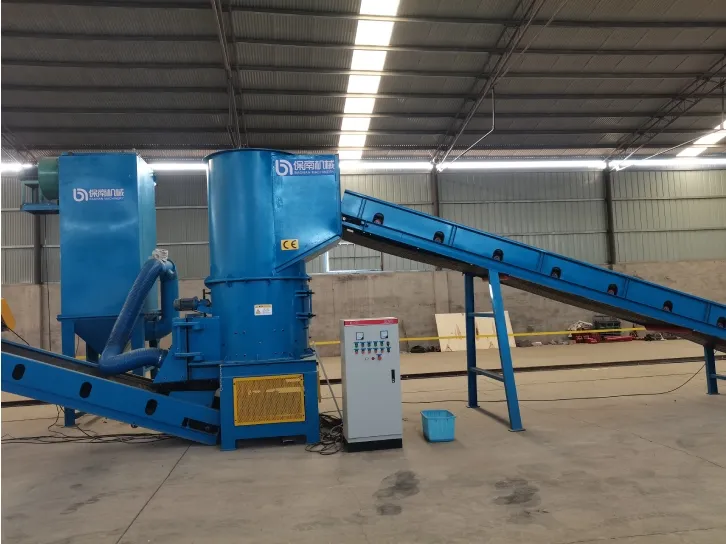

Dec . 13, 2024 00:41 Back to list
The Evolution of Sheet Metal Shredders Revolutionizing Metal Processing
In the world of metal processing and recycling, sheet metal shredders play a crucial role in efficiently managing metal waste. As industries continue to produce a vast amount of waste materials, the need for effective recycling solutions becomes increasingly significant. This article delves into the evolution, significance, and functionality of sheet metal shredders, alongside their impact on sustainability and productivity in the metalworking sector.
Understanding Sheet Metal Shredders
Sheet metal shredders are specialized machines designed to break down large sheets of metal into smaller, manageable pieces. They are primarily used in recycling facilities, manufacturing sectors, and metal fabrication workshops. These shredders can process various types of metals, including aluminum, steel, and copper, making them versatile tools within the recycling industry.
The primary objective of sheet metal shredders is to reduce the size of metal waste to facilitate more efficient transportation, storage, and further processing. By shredding metal sheets into smaller fragments, these machines assist in maximizing recycling opportunities, thereby contributing to a more sustainable approach to metal waste management.
Technological Advancements
The technology behind sheet metal shredders has significantly evolved over the years. Early models relied on basic mechanical systems that required manual operation and offered limited processing capabilities. However, modern innovations have led to the development of automated, high-capacity shredding machines that can handle large volumes of metal waste with minimal human intervention.
Modern shredders are equipped with advanced features such as programmable controls, real-time monitoring systems, and powerful motors that enhance their efficiency and reliability. In addition, innovations in blade design and materials have improved the shredders' durability and cutting effectiveness, allowing them to handle tougher materials without compromising performance. This evolution has not only increased processing speeds but also reduced energy consumption, making shredders more environmentally friendly.
The Importance of Metal Recycling
The recycling of sheet metal is essential for several reasons. First and foremost, it reduces the need for virgin material extraction, which can be environmentally damaging. Mining operations often result in habitat destruction, soil erosion, and water pollution. By recycling metal, we can conserve natural resources and minimize our ecological footprint.

Furthermore, metal recycling contributes significantly to the economy. The recycling industry generates jobs and creates revenue opportunities while reducing the overall costs associated with waste disposal. The use of sheet metal shredders improves the efficiency of recycling processes, allowing for quicker turnaround times and more profitable operations.
According to statistics from the Institute of Scrap Recycling Industries (ISRI), recycling metal saves energy compared to producing new metals from ore. For instance, recycling aluminum uses about 90% less energy than producing it from bauxite, making metal recycling a more sustainable and economically viable option.
Efficiency in Manufacturing Processes
In addition to their role in recycling, sheet metal shredders also enhance manufacturing processes. Manufacturers often generate scrap metal during production, which, if not managed effectively, can lead to increased costs and wasted materials. Integrating shredding solutions into production lines allows manufacturers to reclaim scrap metal immediately, turning waste into a resource.
By reducing the size of scrap metal, manufacturers can optimize space in their facilities and improve the overall flow of materials. This efficiency contributes to higher productivity rates and ensures that companies remain competitive in an ever-evolving marketplace. Moreover, many manufacturers are now focusing on sustainability as a core component of their operations, making the utilization of shredders a strategic choice for both economic and environmental reasons.
Future Trends
As industries increasingly prioritize sustainability, the demand for efficient sheet metal shredders is expected to grow. Manufacturers are likely to invest in more advanced shredding technologies that offer enhanced capabilities, such as improved automation and integration with digital systems for better monitoring and control.
Additionally, innovations in materials and design will further enhance the performance and longevity of shredders, allowing them to handle more challenging materials while maintaining energy efficiency. The future of sheet metal shredding appears promising, as it continues to adapt to the needs of a changing world.
Conclusion
Sheet metal shredders serve as a vital component in the recycling and manufacturing industries. Their evolution has not only made recycling processes more efficient but has also played a significant role in promoting sustainability as a core industrial practice. As technology continues to advance, the capabilities and applications of sheet metal shredders will expand, ensuring that they remain an essential tool for waste management and resource recovery in the years to come.
Latest news
Troubleshooting Common Eddy Separator Problems
NewsJul.04,2025
The Role of Metal Recycling Plants in Circular Economy
NewsJul.04,2025
The Impact of Recycling Line Pickers on Waste Management Costs
NewsJul.04,2025
Safety Features Every Metal Shredder Should Have
NewsJul.04,2025
How Industrial Shredders Improve Waste Management Systems
NewsJul.04,2025
How Cable Granulators Contribute to Sustainable Recycling
NewsJul.04,2025